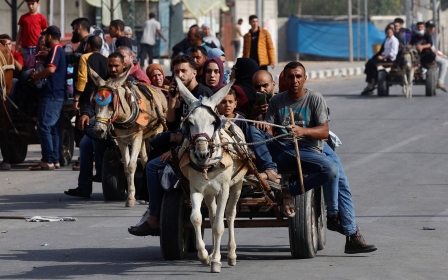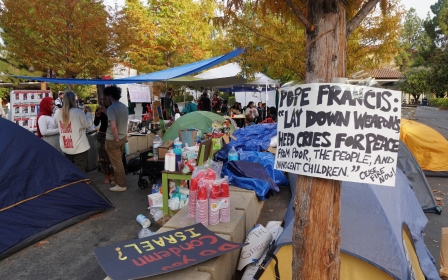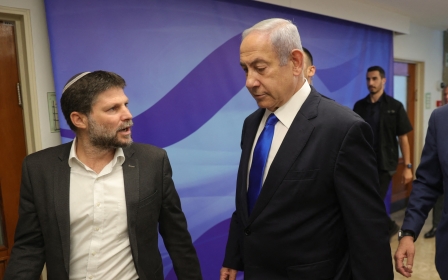Israel-Palestine war: Indonesian Hospital in Gaza besieged as reports of ceasefire denied
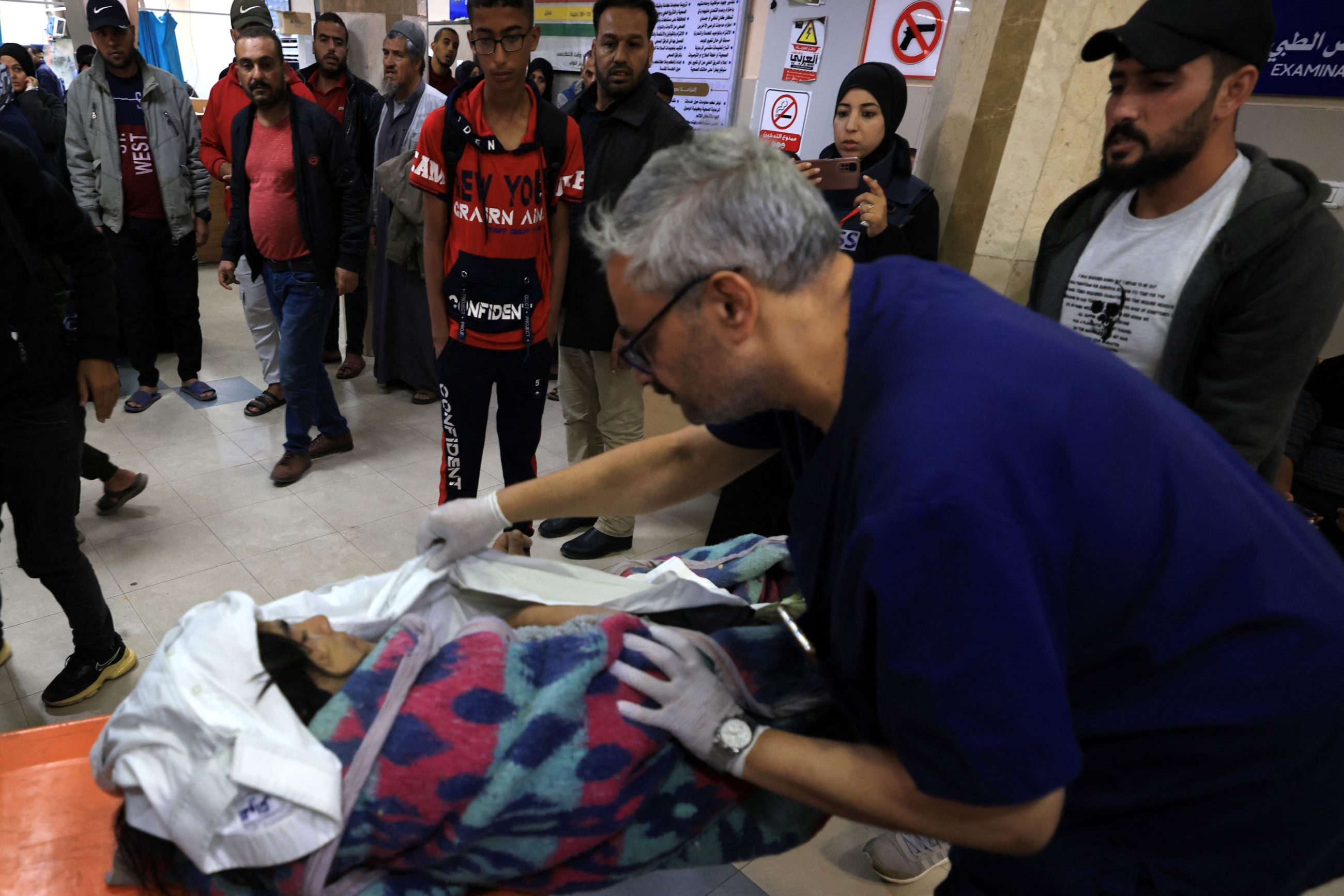
Israeli forces besieged the Indonesian Hospital in northern Gaza's Beit Lahia on Monday, as reports of an imminent ceasefire were vehemently denied by Israel.
With the death toll since 7 October standing at more than 13,000 in Gaza - including at least 5,500 children - Israel has continued its assault on Palestinian health facilities across the besieged enclave.
At least 12 people, including patients, have been killed in Israeli attacks on the Indonesian Hospital, which is still surrounded by Israeli tanks. Around 700 people are trapped inside, according to the Palestinian health ministry.
The head of the World Health Organisation said he was "appalled" by the assault on the hospital.
New MEE newsletter: Jerusalem Dispatch
Sign up to get the latest insights and analysis on Israel-Palestine, alongside Turkey Unpacked and other MEE newsletters
"Health workers and civilians should never have to be exposed to such horror, and especially while inside a hospital," Tedros Ghebreyesus said.
The WHO on Monday also confirmed that 29 premature Palestinian babies had been evacuated from the al-Shifa Hospital, which was stormed by Israeli forces last week, and sent to Egypt.
A WHO spokesperson told Reuters that "three babies still remain" at the Emirati hospital in southern Gaza after being removed from al-Shifa.
"All babies are fighting serious infections and continue needing health care," he added.
Elsewhere, Israeli air strikes killed at least 12 Palestinians sheltering in a UN-run school in the Bureij refugee camp, which lies in a central area of the Gaza Strip that Israel forced people from the north to flee to.
Hisham Zaqout, a journalist for Al Jazeera Arabic, said many more people had been wounded, adding that several of the families affected were looking for food or resting when the air strike hit.
Follow Middle East Eye's live coverage for the latest on the Israel-Palestine war
Monday's violence came shortly after an Israeli official denied Arab media reports that a ceasefire had been set to take place at 11am that day.
The Jordanian al-Ghad newspaper cited a Hamas source as saying a five-day ceasefire was set to commence and that 50 hostages held by the group would be released in exchange for 50 Palestinian prisoners being held in Israeli prisons.
A senior Israeli source was quoted by the Jerusalem Post as saying that "there is nothing as of now".
Around 240 people were taken captive to Gaza during the Hamas-led surprise attack on southern Israel on 7 October, which killed around 1,150 Israelis, most of them civilians. Israel has been waging an offensive on the Gaza Strip ever since, including a ground offensive in recent weeks that has taken much of northern Gaza.
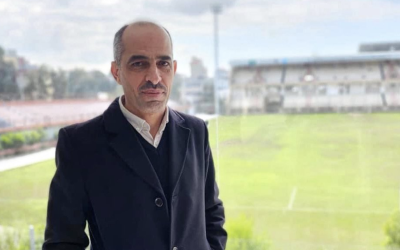
Israel says 66 of its soldiers have been killed in Gaza since the ground offensive began on 30 October.
Sunday evening saw the death of "godfather of Palestinian journalists" and chairman of Gaza's Press House, Belal Jadallah.
Jadallah's sister told Reuters that he was killed by an Israeli tank shell in the Zeitoun neighbourhood, before being taken to a medical centre where he was pronounced dead.
The deaths bring the number of journalists in Gaza killed since the start of the war to 48, according to the Committee to Protect Journalists (CPJ), which has described the death toll as unprecedented
Sherif Mansour, the CPJ's Middle East and North Africa Programme Coordinator, told MEE earlier this month the Israeli army needed to make their rules of engagement more transparent, as many of the journalists in Gaza "may not have the option to avoid combat situations".
"Of course the toll is heartbreaking and unfortunately it is paid by, and continues to be paid by, Palestinian journalists who face an outsized risk," he explained.
"This is a sacrifice that should not be made easily."
Hospitals evacuated
The forced evacuation of al-Shifa Hospital over the weekend saw an exodus of people to southern Gaza, with many vulnerable patients, internally displaced people, and medical personnel made to leave.
Ashraf Mohsen, a 42-year-old doctor who had worked in the recovery department of specialised surgeries at the hospital, told Middle East Eye that they had left "in the thousands".
"I don't know if intensive care patients were evacuated, but I saw the intensive care doctors with us on the way, and they were evacuated," he said.
According to Mohsen, the Israeli military contacted Marwan Abu Saada, the head of general surgery, and asked him to evacuate the building at 9am on Saturday.
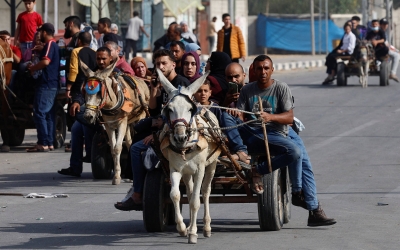
Once out of the building, Mohsen said he could not recognise the streets due to the sheer destruction.
"Everything had changed. The Israeli army burned all the doctors' and staff cars next to al-Shifa," he said.
"There were planes above, filming us, and the soldiers asked us not to go out and to raise our hands. Any movement would result in death. We were allowed to leave from Wihdeh Street to Shujaiyya.
"There was a fleet of tanks, bulldozers and military jeeps up to the Ailat intersection."
Israel has long claimed that the hospital housed a Hamas "command centre" and since capturing the building has cited the discovery of a few weapons and an underground tunnel on the site's perimeter as proof of the group's presence there.
The Palestinian health ministry and Hamas deny the accusation.
Israel's attacks on healthcare facilities comes as tens of thousands of Palestinians have been wounded by its offensive.
Turkey said 200 Palestinians from Gaza arrived in the country on Monday, including dozens of patients who will receive medical treatment.
Health Minister Fahrettin Koca said 61 patients, accompanied by 49 relatives, had arrived in Ankara on Monday afternoon after being brought out to Egypt on Sunday.
"In terms of protecting human dignity, I think the steps we have taken provide a contribution, though very small," Koca told reporters at the airport.
The priority for evacuations was now children, babies and wounded civilians, he added.
Brics meeting
Diplomatic efforts have so far failed to achieve any let-up in the violence in Gaza, but discussions have continued among a variety of international powers.
Russia said on Monday that President Vladimir Putin would take part in a virtual summit of the Brics group of nations on Tuesday to discuss the conflict.
Chaired by South African President Cyril Ramaphosa, the meeting is to attempt to form a collective response among the nations.
United Nations Secretary-General Antonio Guterres is also set to attend the meeting.
Several countries, including close allies of Israel, have become more vocal about the ongoing destruction in Gaza.
French President Emmanuel Macron's office said he had told Israeli Prime Minister Benjamin Netanyahu on Sunday there were "too many civilian losses" in the enclave.
Macron also stressed the "absolute necessity to distinguish terrorists from the population" and "the importance of achieving an immediate humanitarian truce leading to a ceasefire".
Middle East Eye delivers independent and unrivalled coverage and analysis of the Middle East, North Africa and beyond. To learn more about republishing this content and the associated fees, please fill out this form. More about MEE can be found here.


